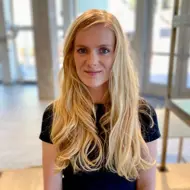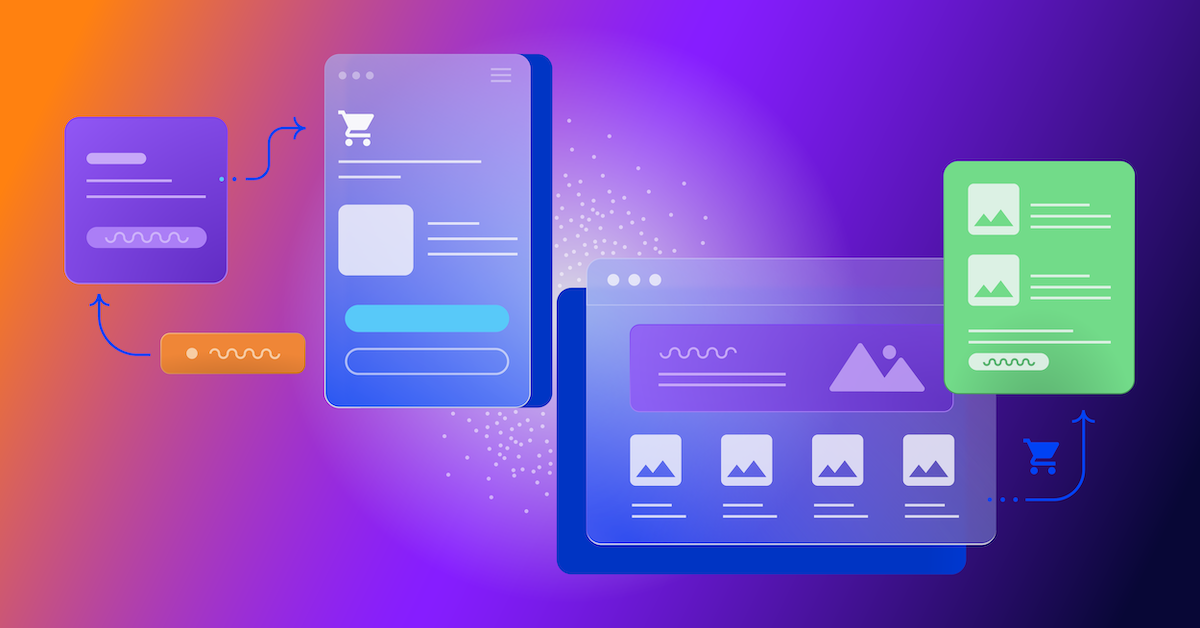How I/Own It gave me a new purpose as an engineer
Read on to learn more about the program and experience from I/Own It alumni and current Optimizely software engineer, Polina Nguen.

Polina Nguen

What were you doing before I/Own It?
Less than a year ago, I was still working as a HVAC (heating, ventilation and air conditioning) systems design engineer at a MEP (mechanical, electrical and plumbing) consulting firm in San Francisco. I worked closely with architectural, structural, electrical and plumbing engineers to design high-performance buildings including residential complexes, biotech research facilities and office spaces.
I was first introduced to HVAC systems several years ago during my first internship as a construction project engineer at a consulting firm in Blue Bell, Pennsylvania. My team was based at Merck in West Point, the largest pharmaceutical facility in Pennsylvania. I worked with many talented engineers on a variety of different tasks including site supervision, developing construction execution plans and solving technical and administrative problems. I went on tours around the facility and watched as giant mechanical equipment bigger than my apartment unit put in together to serve industrial cleanrooms. It was fascinating to see all the HVAC systems including boilers, chillers, cooling towers and other equipment come together to keep the facility running. At that time, I was sure that HVAC systems design would be the right career path for me.
How much coding experience did you have prior to applying to I/Own It ?
My coding journey started in Moscow, Russia, where I took a couple of introductory computer science courses at Moscow State Institute of Electronics and Mathematics. I loved math and physics above all other disciplines at that time, so I decided to pursue a degree in mechanical engineering when I moved to the U.S. and transferred to Drexel University. It was there that I first learned about and used MATLAB as part of my engineering curriculum. Only then did I realize the endless potential of coding. I remember feeling excited and accomplished when my code would finally work!
After graduating in 2016 and working as a mechanical engineer for about a year, I started wondering if I made the right career choice as my desire to code never left me alone. I started taking online courses on Treehouse, where I learned the basics of Python and JavaScript. Shortly after, I applied to OMSCS (Online Master of Science in Computer Science) at Georgia Tech. At that point, my passion to code had become even stronger. I was ready to do whatever it took to transition to a career in software engineering. I wanted to be closer to Silicon Valley, so I quit my job in Philadelphia, and since I was not ready to get into the software engineering industry yet, I found another mechanical engineering position in San Francisco.
 A few months and a cross-country move later, I received a response from Georgia Tech informing me that I was accepted into their program. I started taking online courses while continuing to work full-time. The level of programming that Georgia Tech required was way above my skill set, which led me to spend many sleepless nights trying to catch up on homework.
A few months and a cross-country move later, I received a response from Georgia Tech informing me that I was accepted into their program. I started taking online courses while continuing to work full-time. The level of programming that Georgia Tech required was way above my skill set, which led me to spend many sleepless nights trying to catch up on homework.
How did you find out about I/Own It? Why did you apply and what was the application process like?
During my first year at Georgia Tech, I learned about the fundamentals of computer networking, information security and computer architecture. I was able to describe what stack and heap are and what role they play in efficient memory allocation. While it opened up a whole new world of computing systems, I still lacked the skills I needed to make the jump to software engineering.
My friend, a recent Hack Reactor graduate who worked at Uber, convinced me that a coding boot camp was exactly what I needed. He encouraged me to apply for Hack Reactor’s Immersive Software Engineering program. After researching the program, visiting the Hack Reactor campus and seeing what my friend has achieved after completing the program, I decided to apply. He was also the one who sent me the link to the Optimizely I/Own It program that he knew about from other students in his cohort. A company known for its leading experimentation platform was offering a full-tuition scholarship and a three-month internship with mentorship and financial support to individuals underrepresented in the tech industry. I first wondered, “Is this real?” when I read about it. I didn’t know that this type of scholarship existed, and I hadn’t heard of any other company offering something like it. The application process was straightforward: answer five questions about yourself, your software engineers goals and how you would promote diversity and inclusion as a software engineer. I also submitted a short video about how I have taught my dog to do tricks and included a YouTube link in my application.
About a week later, I was contacted by an Optimizely recruiter who scheduled an hour-long Zoom interview with two software engineers and Hack Reactor alumnae, Jessica Chong and Acacia Pappas. In the interview, I introduced myself first and answered a few questions regarding my work and school experience and why I chose to become a software engineer. At the end, I had a chance to ask questions and learn more about the interviewers and Optimizely’s culture.
About two weeks later, Optimizely called to congratulate me on winning the scholarship. It was one of the happiest moments of my life. I was just given a golden ticket to pursue the career I dreamed of for so long. There were no words to describe how thankful I was and what it meant for me and my future. I was so excited to start the journey!
What was your experience at Hack Reactor like?
Hack Reactor Software Engineering Immersive was unlike any other educational program I had ever attended. For the first time, I was surrounded by people I could share my passion with and put everything I had into improving the skills I desperately wanted to grow. The two-day pair-programming sprints during the first half were a great way to learn how to code collaboratively with a partner, and practice whiteboarding and speaking out loud while coding.
High-quality Zoom lectures, almost always led by Fred Zirdung, an expert in the industry and a head of Hack Reactor curriculum, were extremely helpful in understanding some of the key JavaScript concepts and provided a base to jump off of at the beginning of each sprint. The amount of material covered in the first half was enormous. Within the first six weeks, I was exposed to a variety of different data structures and algorithms; learned to build interactive chat applications, games and single-page web applications with jQuery, D3 and React; created a RESTful API with Node; and developed a full stack web application.
Two other I/Own It recipients and I would gather with our mentoring crew from Optimizely every couple of weeks, which gave us the opportunity to share our experiences and talk through any challenges. My mentor, Ryan Yee, was also available on Slack in case I wanted to discuss any of my questions privately.
Our days were scheduled by the hour during the first six weeks from 9 am till 8 pm, six days a week. Some of us would continue to study after hours. It was hard mentally and physically. Each sprint contained extensive “bare minimum requirements.” There was also an “advanced” section followed by a “nightmare mode.” The staff made sure every one of us was challenged and had an opportunity to push our boundaries. I would constantly lose track of time and forget to eat lunch or dinner trying to get as far as I could in each of the sprints.
The second half was less structured and mostly focused on completing two group projects. That was when I really started to have fun. In the first project, I worked with two other students on building a front-end web application of our choosing while using my newly learned skills and continuing to explore new technologies on the fly. The second project was even more exciting, where I scaled the backend of a web application utilizing tools such as AWS, loader.io, New Relic, NginX and set up source-replica configuration of MySQL database.
By the end of the program, I was able to autonomously learn new technologies and solve technical problems. Hack Reactor gave me confidence in myself and helped me to develop skills to launch my new career.
What did you do during your internship?
My remote internship at Optimizely started the week after graduating Hack Reactor. I joined the DevX (Developer Experience) team, which owns the Optimizely Full Stack SDKs, Agent and other services that enable customers to make decisions, collect data and integrate with other relevant technologies. I was assigned a mentor, Ali Rizvi, a staff software engineer with more than 10 years of experience in the industry including six years at Optimizely. I met with him every week to go over my progress and we maintained constant Slack communication. His extensive and deep technical knowledge about the Optimizely products and overall company structure has been key to my successful internship experience.
I worked on several projects throughout my internship. During the first one, I used Sphinx to generate documentation from our Python SDK source code and published it on Read the Docs, a hosting platform set up to watch for changes in our repository and to automatically rebuild, test and update our documentation on every merge. This tool also allows for multiple release versions of our Python SDK API reference documentation to be available online.
As a second project, I had the opportunity to familiarize myself with the JavaScript SDK and improve its performance by optimizing imports to reduce bundle size. Our technical lead, Matt Carrol, was always available to answer my questions and provide constructive feedback on my PRs. These changes went live and have made a positive impact on the way our clients use and integrate with our JavaScript SDK. Leaving my mark on the library that has over 80,000 weekly downloads made me even more excited about my work and strengthened my desire to continue contributing to our team’s deliverables.
 The second half of my internship was focused on building and testing customer-facing front-end features in React alongside Son Pham, another great software engineer from the original Machine Learning Products team. Son taught me how to navigate Optimizely’s monolithic codebase and provided tremendous support in the form of daily check-ins, pair-programming, instant code reviews and constant Slack communication. As a result, I made a significant contribution to delivering two critical projects with tight deadlines.
The second half of my internship was focused on building and testing customer-facing front-end features in React alongside Son Pham, another great software engineer from the original Machine Learning Products team. Son taught me how to navigate Optimizely’s monolithic codebase and provided tremendous support in the form of daily check-ins, pair-programming, instant code reviews and constant Slack communication. As a result, I made a significant contribution to delivering two critical projects with tight deadlines.
My internship would not have been as fun and exciting without the support from Mike Ng, my DevX engineering manager and I/Own It program manager. Mike was committed to providing the support I needed in order to succeed. Our weekly one-on-ones helped me to stay on track and gain confidence in my software engineering skills. I felt comfortable reaching out to him with any questions knowing he would always find the time to respond despite his busy schedule.
My internship experience at Optimizely far exceeded my expectations. Despite not working in a traditional office environment as was originally planned, I managed to get the most out of it and truly felt like a part of the amazing Optimizely community even while working from home.
How does working in software compare w/ your experience as a mechanical engineer?
As a HVAC design engineer, I almost never got a chance to learn the latest, most advanced technologies. My day-to-day duties included working with the data about a particular facility or a building and performing energy calculations to figure out cooling and heating loads using Trace, the same software program that has been around since the 1970s. I spent most of my time coordinating with other disciplines and modelling HVAC systems in Revit or AutoCAD. At some point, my work became repetitive and eventually I lost interest in doing it.
The software engineering industry is different. It is all about new ideas and learning different tools and strategies to make those ideas work. In these past few months, I was exposed to so many new technologies, and I know that it is just the beginning! I worked on a variety of different tasks throughout my internship utilizing different tools and frameworks. I felt alive. Optimizely gave me a new purpose as an engineer and brought my curiosity, critical thinking and problem solving skills to the next level; the level at which I am ready to launch my career as a full-time software engineer.
What advice do you have for anyone applying for I/Own It?
Do not hesitate and do not think twice; just do it. We want to hear your story and help you get the career you deserve. You will be amazed by how much you can achieve once you start the journey!
What advice do you have for people considering going to Hack Reactor?
If you are not sure whether or not you should do Hack Reactor Software Engineering Immersive, I would suggest taking the time to complete the Hack Reactor Prep Program first. It will give you a great introduction to JavaScript fundamentals and prepare you for the technical admission assessment. After completing, ask yourself two simple questions. Did you enjoy taking the course? Would you continue learning JavaScript? If your answer is “YES,” go ahead and apply! It does not matter what your background is or how much coding experience you have. You will succeed if you are ready to put everything aside for three months and commit yourself to learning to code.
